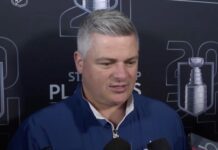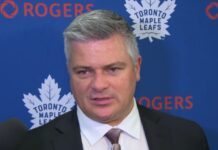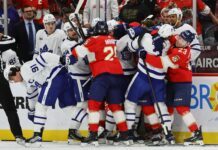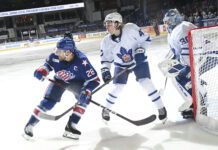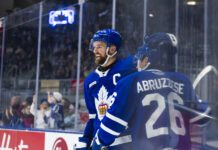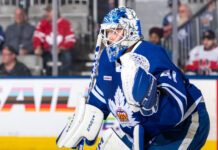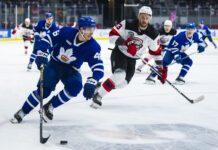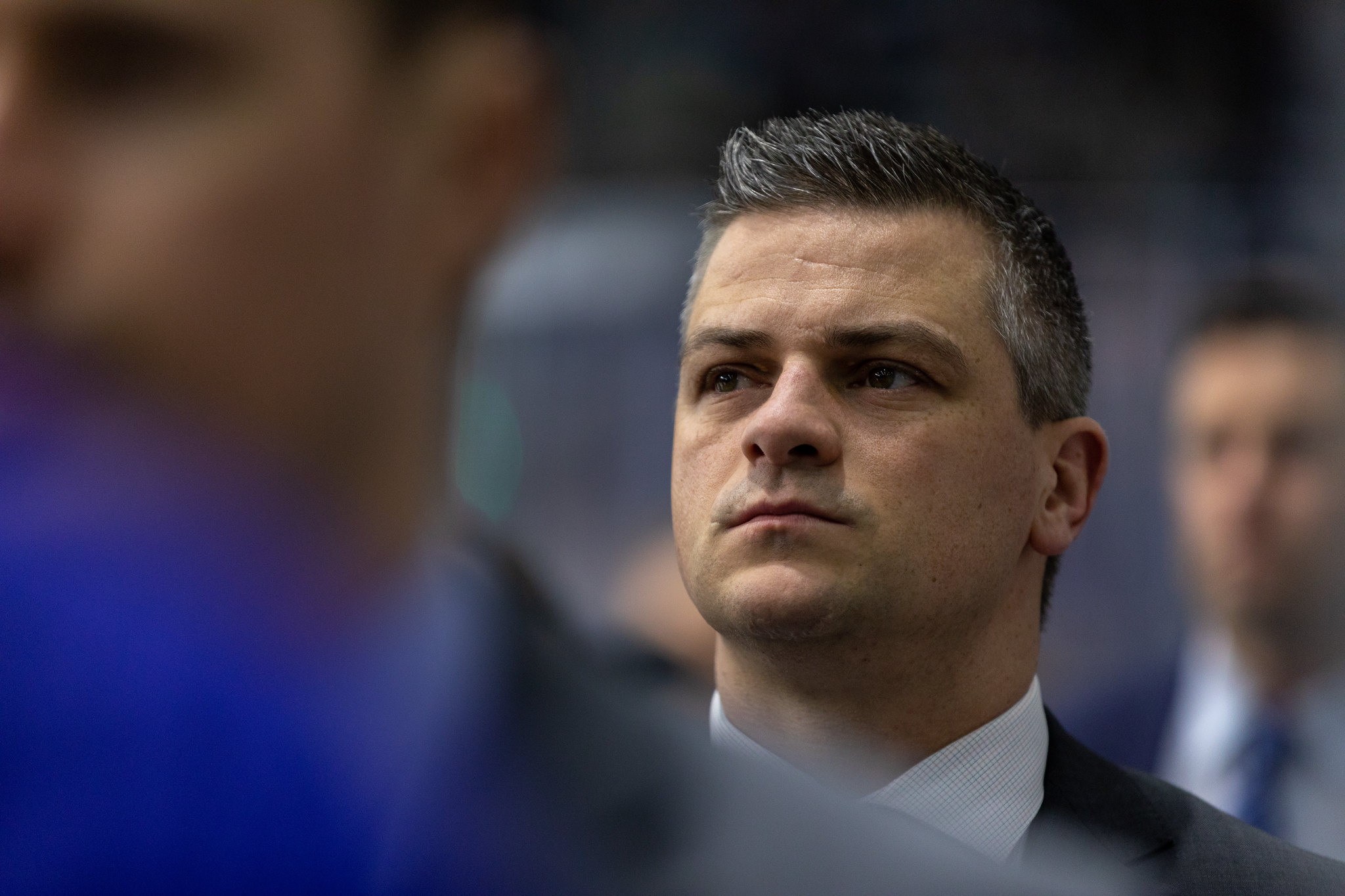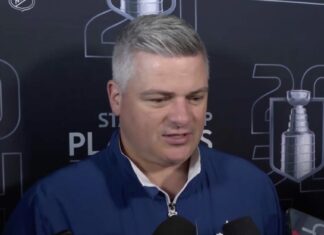Sheldon Keefe joined Hockey Central at Noon on Tuesday to discuss his journey to becoming Toronto Maple Leafs head coach, his message to his players during the suspended season, Rasmus Sandin’s progress at the NHL level, the addition of veteran forward Kyle Clifford, and much more.
It’s been quite a journey for you to become head coach of the Toronto Maple Leafs — 14 years of head coaching experience and a number of championships in the CHL and the Calder Cup with the Marlies. Do you ever have to pinch yourself when you’re living out what is a career dream?
Keefe: It certainly is an honour beyond belief for anybody in hockey. As someone who grew up in the area here and whose family is still in the area, it is a special feeling. There are definitely those moments in time where you kind of catch yourself. At the same time, when you get going in the day-to-day and you’re busy, it kind of blocks all of that part of it out. But I think it is nice and it is important at the same time to keep things in perspective. It is an honour and a responsibility that you have.
Take us through your progression to the job — from the Soo all the way to the NHL.
Keefe: I am pretty fortunate in a lot of ways that I was able to make that quick transition from OHL to pro hockey, and then finding my way to the NHL. It was really on the backs of the better part of seven years at the junior-A level starting in Pembroke with the Lumberkings. I started coaching right out of playing, and I was fortunate that I owned the team at the time.
While I was still playing, I bought the junior-A team. It was more something that I thought would be kind of cool, to have a chance to own a team, and maybe something I would enjoy doing. I thought it would be a lot further down the road than it was, but nonetheless, it gave me an opportunity to stay involved in the game.
I quickly learned through my time, even while still playing and owning the team, that I really had a connection with that side of the game. I had a chance as an owner to give myself a job and coach and learn on the fly — all of those types of things. Those years were massive for me on so many levels — not just the coaching side, but also as a man developing a young family, it gave me some stability and I got going from there.
And then your next step after that?
Keefe: Well, after those years in Pembroke, I was fortunate to get the call from Kyle Dubas, who was in the Soo at the time. He was looking at making a coaching change mid-season. It was late November or early December. Getting that call that he wanted to make a change, I was fortunate to get a chance to go in there on the fly. It was a major, major change — a major life change. It happened pretty much overnight, having to pack up and leave Pembroke and head to the Soo to assume duties there.
I was in the Soo for the rest of that season plus two more, and then I got the call from Kyle to take over with the Marlies organization there. That was my intro to pro hockey. I coached a little over four seasons there, and of course, mid-season, I got the call to join the Leafs and got my chance in the NHL.
It’s not handed to you and it’s not who you know. You’ve got to put in your time. Your winning percentage with Pembroke and the Soo and the Marlies was phenomenal. It’s a lot of years. How long was it from your first coaching job until the Leafs?
Keefe: I think it was 14 years that I was a head coach that went into it. Those 6.5-7 years in Pembroke were really where it started and where I was really starting over in so many ways. You’re not in pro hockey. You’re not even in major junior hockey, but you’re starting in a small town in junior-A hockey. That’s really where it was for me. As I said, I was the owner of the team as well, so it wasn’t even really about coaching, frankly. As an owner of a junior-A team, you are doing everything, from scouting to recruiting — that junior-A league is one of the only leagues in Canada that actually has a draft — and you’re also handling billets and all of the sponsorships and community work.
That’s really where I felt I grew the most — in that area. The coaching was kind of learning on the fly and almost secondary, but that was really my foundation as a man to go from playing to all of a sudden running a business and it just so happens to be in hockey. You’re running a business that is truly engrained in the community there in Pembroke and I really learned the value of community and the value of people.
We also ran the concessions there in Pembroke when I was there, too. Sometimes you would be stocking the snack bar and loading up the truck with all of the different supplies, from french fries to coffee to everything that you normally get in your minor hockey arena. We would be handling all of that. A lot of the times I would be planning practice while tying my skates because we were so busy doing other things. That gave me a chance to stay in the game and learn on the fly. Without that organization and all of the people that gave me a chance there and supported our cause while trying to run a junior-A team, I wouldn’t have a chance at doing what I am doing now.
How has the transition been to coaching in terms of handling the media? Do you read the headlines? Do you keep up with what the media is saying?
Keefe: It is difficult, of course. I think it is important to stay focused on the task at hand, but at the same time, I don’t hide from the fact that a major part of my job and my responsibility is to handle the media on a daily basis. I think it is important to have a sense of what is being talked about and how my words impact what is out there and what the players are consuming. Our media relations team does a really great job of keeping me in the loop with what is happening. I get a bit of a snapshot every day of the headlines and what is being talked about. We don’t really have the time to consume the details of it, but you get a quick sense of the narrative.
I did take a lot of time while I was with the Marlies in the American league to really learn about the media knowing that if I was ever going to coach in the NHL, it was going to be a big part of what I was going to do. I am right here in this market where everything is right there. Having someone like Mike Babcock, who is so experienced and so good at handling the media, it gave me a chance to really see how he answers questions and how things go. For a long time now, I’ve watched a lot of coaches and how they handle their scrums.
I think it is important to know what is happening, but it is also important to stay confident and focused on the things that are most important to you as a coach and your team. But I can’t hide from the fact that is a major part of the job in this market, in particular.
It’s been almost a month now since the pause. How often do you talk to your players? How important is it to make sure they’re staying in some sort of shape because there is a possibility they get back on the ice?
Keefe: It is a challenge, of course, on so many levels. A lot of our staff — our training staff, medical staff, conditioning staff — do a really good job of staying on top of those types of things and working with the players depending on what their individual situation is. My communication with the players is varied from phone calls to text messages to all of those types of things to stay connected with all of that.
It is challenging in a lot of different ways. There is the uncertainty of not knowing when you are going to play, but the big thing for us is just to remain focused on the day to day and try to control what we can control in terms of being prepared both as a coaching staff doing our job and the players. We acknowledge it is a difficult time, but we have to stay focused on what we can and at the same time, just trust that the right decisions will be made by the health officials and the NHL and the NHLPA. We just have to do our part to stay home and allow everything to take its course and be prepared as possible for when we do get back.
How are your injured guys doing?
Keefe: They’re doing really well. The reports that I have gotten: Mikheyev had been skating almost every day, as the injured players had been continuing their rehab protocols across the league. Mikheyev and Muzzin had been our two guys that continued to work their way back to full health. The reports are that both are doing very well. If and when we are to resume, those guys would be available to us.
It is such a young team you have in Toronto. There are so many guys at the beginning of their careers. You only really have a few seasoned veterans. Two of them in Kyle Clifford and Jason Spezza are pending UFAs. How do those two guys provide some help for you in terms of setting an example for some of the younger players on the team?
Keefe: They certainly do help and experience is important. Those are two of the guys for sure that offer a lot in that department for us. Obviously, John Tavares does as well know. Jake Muzzin does. Morgan Rielly. They have their own experiences that go a long way for our group. Their voices are important and I’ve learned to really rely on that.
Kyle Clifford’s addition to our group, I think, was a very good one — not only with what he says but just the way that he goes about his business every day. He is the first to arrive in the building every single day. He doesn’t take a day off. It seems like he doesn’t take a minute off in terms of his focus and his preparation — everything that he is doing — to give himself an opportunity to be ready and to perform. A lot of that comes from where he came from the environment he came from in LA and the success they had in that organization winning Stanley Cups. We are able to benefit from that.
Each player that we have brings their own experience. We have some younger players that have some great experience and leadership qualities as well. It is just a matter of things taking their time to develop and come together. I think that is really where we are. It is a very young team and it has also had a lot of turnover from one year to the next. Part of our evolution here is taking some time for it to really come into form.
When we have been at our best, we have really liked what we have seen. Of course, we haven’t done it nearly enough and consistently enough. That is our greatest challenge: To get to that level.
Tell us about Rasmus Sandin. He has had some really good games but has struggled a bit at times.
Keefe: He is still a young defenseman. You do expect that he is going to have some moments that aren’t going to go so well. But the fact that we have seen some really strong games and strong play from him — particularly his play with the puck and his poise and confidence he shows at the NHL level — it is a really good healthy sign for us and his future. As he gets stronger and more comfortable with the pace and the strength of the players away from the puck and in 50-50 situations and net-front battles, as he did at the AHL level where things happen a little bit slower, we think we’ve got a great player there.
The tools are all there. He is an incredible kid. He works extremely hard. He is very focused and confident in himself. In time, he is going to prove to be a very important piece of our club.
When it comes to playoff formatting if the season could be saved down the stretch, are you looking at it in any particular way in terms of what the best-case scenario would be?
Keefe: Certainly, like anyone else internally, you are going to have your discussions and debates and what-ifs. Every time I really bring it back to the fact that nobody knows and so many things are out of our control here. We’ve just got to trust the judgement of the health officials and that the NHL is going to make the right decision for everybody. It is our job as a staff and as players to control what we can control and be prepared as possible for when whatever the format might be and whatever the timelines might be. We just focus on every day as it comes and try to get a little bit better every day despite the circumstances and the conditions that we have and that we’re in.
It also keeps it in perspective, too, that there are a lot bigger things happening in the world that are more important than what we have going on. Stay focused on what we are doing and also think about and be grateful for all of the people that are doing their best to help us get back to normalcy.


